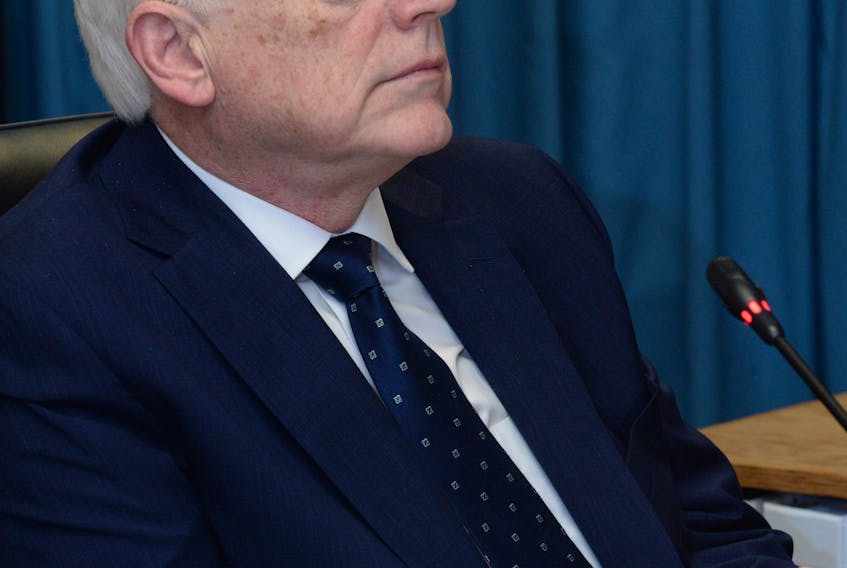Hearing former Nalcor CEO Ed Martin on the witness stand this week talking about cost estimates and project schedules and authorizations for expenditures, I wondered how many people in the province are actually following the Muskrat Falls inquiry.

Testimony can go deep into the weeds and it can be difficult to follow questions and answers when they delve into the minutiae of contracts for a hydroelectric project that was pitched as a $6.2-billion plan for low-cost energy and is now a bloated $12.7-billion behemoth that we simply can’t afford.
Let’s face it — not everyone would choose to be face and eyes into the inquiry’s live webcast or attend hearings at the Beothuck Building for months on end, even if they had the time.
Fortunately, the media is there, watching and listening.
I know some people follow the proceedings keenly, but I’ve heard others ask what’s the point — Muskrat Falls can’t be undone and the $33.7-million inquiry is seen as a further waste of taxpayers’ money.
If you aren’t paying attention, you should be.
Because it is absolutely necessary, not only because it is exhuming evidence about how this megaproject went irretrievably off-course, but also because it is revealing glaring gaps in accountability and due diligence that need to be sealed up tight.
Ed Martin’s intransigence on the stand notwithstanding, the amount of autonomy he wielded on the Muskrat Falls project was ceded to him by the Progressive Conservative government who created Nalcor and allowed the CEO such authority.
In December 2013, Kathy Dunderdale’s government hailed the signing of the federal loan guarantee for Muskrat Falls as a stupendous moment on par with the completion of the national railway. There were patriotic songs, cake and Christmas carols.
Martin has acknowledged he didn’t share an internal capital cost estimate of $7 billion given to him by Nalcor’s project management team with government officials or cabinet ministers in 2013. At the time, the public was being sold on a project expected to cost $6.2-billion.
Martin’s explanation was that there was no point in sharing a number that was still a moving target as the project kicked into gear.
As then CEO of the Crown corporation responsible for Muskrat Falls, he acknowledges he was ultimately accountable; perhaps the problem was that he was not pressed to be accountable enough.
Perhaps the politicians weren’t accountable enough, either.
In December 2013, Kathy Dunderdale’s government hailed the signing of the federal loan guarantee for Muskrat Falls as a stupendous moment on par with the completion of the national railway. There were patriotic songs, cake and Christmas carols.
“We are shouldering our unshrinkable responsibility to leave no stone unturned, no resource untapped and to ground Newfoundland and Labrador’s future firmly and securely in the solid bedrock of sustainable and renewable prosperity,” she proclaimed in a particularly bombastic speech.
All the while, the cost of Muskrat Falls was steadily ticking on.
Perhaps the inquiry will conclude that this farcical and financially crippling episode in our province was an unfortunate coalescence of events; the result of too many people in positions of power putting personal or political interests before those of the people and the integrity of the public purse.
It might also conclude that Crown corporations need stricter controls and less sovereignty, and that premiers and cabinet ministers must do more to keep them in check.
A 2016 report from Canada’s Public Policy Forum, “Crown Corporation Governance,” warns that a hands-off approach by governments can make accountability difficulty to enforce.
It states, “from the perspective of the government of the day, operational decisions made with board approval but without ministerial knowledge may create unforeseen consequences that directly involve the elected government.”
Not to mention unforeseen consequences for a misinformed public.
In British Columbia, they’ve created a Shareholder’s Expectations for British Columbia Crown Agencies document that outlines the kind of controlled relationship that must exist between governments and Crown corporations in order to protect the public interest.
According to inquiry testimony, a “shareholders expectation” letter was being drafted in the Department of Natural Resources, but it got lost somewhere along the way.
If the inquiry results in mandated accountability and honesty between the government, Crown corporations and the people they are supposed to serve, it will be worth every cent.
Pam Frampton is The Telegram’s managing editor. Email [email protected]. Twitter: pam_frampton
MORE FROM PAM FRAMPTON









